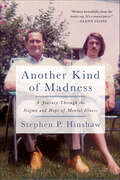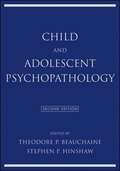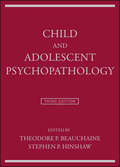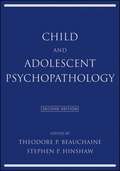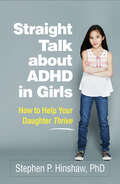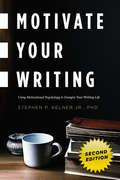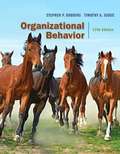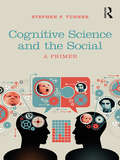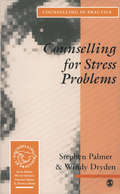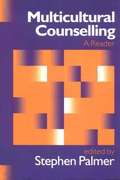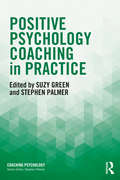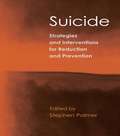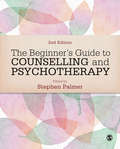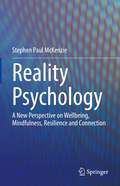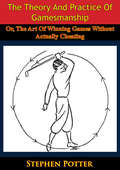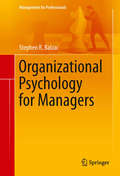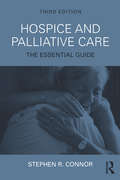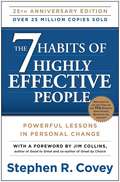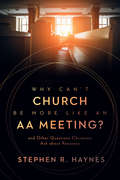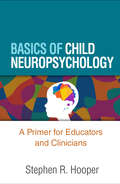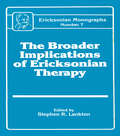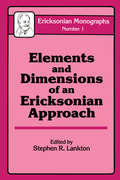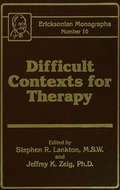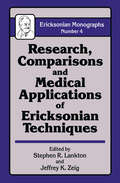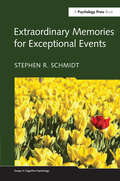- Table View
- List View
Another Kind of Madness: A Journey Through the Stigma and Hope of Mental Illness
by Stephen P. HinshawWINNER: Best Autobiography/Memoir, 2018 Best Book Awards, sponsored by American Book Fest Glenn Close says: "Another Kind of Madness is one of the best books I’ve read about the cost of stigma and silence in a family touched by mental illness. I was profoundly moved by Stephen Hinshaw’s story, written beautifully, from the inside-out. It’s a masterpiece."A deeply personal memoir calling for an end to the dark shaming of mental illnessFamilies are riddled with untold secrets. But Stephen Hinshaw never imagined that a profound secret was kept under lock and key for 18 years within his family—that his father’s mysterious absences, for months at a time, resulted from serious mental illness and involuntary hospitalizations. From the moment his father revealed the truth, during Hinshaw’s first spring break from college, he knew his life would change forever. Hinshaw calls this revelation his “psychological birth.” After years of experiencing the ups and downs of his father’s illness without knowing it existed, Hinshaw began to piece together the silent, often terrifying history of his father’s life—in great contrast to his father’s presence and love during periods of wellness. This exploration led to larger discoveries about the family saga, to Hinshaw’s correctly diagnosing his father with bipolar disorder, and to his full-fledged career as a clinical and developmental psychologist and professor. In Another Kind of Madness, Hinshaw explores the burden of living in a family “loaded” with mental illness and debunks the stigma behind it. He explains that in today’s society, mental health problems still receive utter castigation—too often resulting in the loss of fundamental rights, including the inability to vote or run for office or automatic relinquishment of child custody. Through a poignant and moving family narrative, interlaced with shocking facts about how America and the world still view mental health conditions well into in the 21st century, Another Kind of Madness is a passionate call to arms regarding the importance of destigmatizing mental illness.
Child and Adolescent Psychopathology
by Theodore P. Beauchaine Stephen P. HinshawChild and Adolescent Psychopathology, Second Edition is the only comprehensive text on childhood and adolescent disorders that addresses genetic, neurobiological, and environmental factors within a developmental perspective. The new edition includes more on epigenetics, classification, culture and context and emphasizes how, when, and why disorders emerge among young people and in what ways symptom profiles change at different stages of development.
Child and Adolescent Psychopathology
by Theodore P. Beauchaine Stephen P. HinshawA unique, multi-discipline, developmental approach to childhood psychopathology Child and Adolescent Psychopathology is the only comprehensive text in the field to address genetic, neurobiological, and environmental factors within a developmental context. Based on cutting-edge research and aligned with the DSM-5, this book emphasizes how, when, and why disorders emerge among young people, and the ways in which symptom profiles change at different stages of development. This new third edition has been updated to include new chapters on OCD and trauma disorders consistent with DSM-5 classification, and includes new discussion on epigenetics and the neighborhood effects on the development of delinquency. Coverage includes extensive discussion of risk factors, from disturbed attachment relations and abuse/neglect, to head injury and teratogen exposure, followed by in-depth examination of behavior disorders and psychological disorders including Autism Spectrum, Schizophrenia Spectrum, and Eating Disorders. Psychological disorders in children are increasingly being explored from a relational perspective, and continuous advances in neurobiology research are adding an additional dimension to our understanding of cause, effect, and appropriate intervention. This book provides detailed guidance toward all aspects of childhood psychopathology, with a multi-discipline approach and a unique developmental emphasis. Discover how psychopathology emerges throughout the stages of development Learn how both genetics and environmental factors influence risk and behaviors Understand the prevalence, risk factors, and progression of each disorder Gain deep insight from leading experts in neurobiology and developmental psychopathology As the field of child psychology continues to evolve, behavioral and psychological disorders move beyond a list of symptoms to encompass the 'whole child'—biology, chemistry, environment, and culture are becoming increasingly relevant in understanding and treating these disorders, and must be considered from the earliest assessment stages. Child and Adolescent Psychopathology provides comprehensive information on childhood disorders from a developmental perspective.
Child and Adolescent Psychopathology (2nd Edition)
by Theodore P. Beauchaine Stephen P. HinshawChild and Adolescent Psychopathology, Second Edition is the only comprehensive text on childhood and adolescent disorders that addresses genetic, neurobiological, and environmental factors within a developmental perspective. The new edition includes more on epigenetics, classification, culture and context and emphasizes how, when, and why disorders emerge among young people and in what ways symptom profiles change at different stages of development.
Straight Talk about ADHD in Girls: How to Help Your Daughter Thrive
by Stephen P. HinshawParenting a daughter with attention-deficit/hyperactivity disorder (ADHD) is no easy path--especially because of the myth that the disorder is rare to nonexistent in girls. From pioneering researcher Stephen P. Hinshaw, this empowering guide provides vital information and advice to help you understand and meet your daughter's needs. Dr. Hinshaw delivers up-to-date facts on what ADHD is, why symptoms often appear differently in girls than in boys, why girls with ADHD behave the way they do, how to get an accurate diagnosis, and what treatments are most effective. There is so much pressure on girls to be "perfect"--and for those with ADHD, it feels especially hard to measure up. Learn concrete steps you can take to support your daughter's success from preschool through high school and beyond, while nurturing her confidence and self-worth.
Motivate Your Writing: Using Motivational Psychology to Energize Your Writing Life
by Stephen P. Kelner Jr.Energize and organize your writing life by tapping into your fundamental motivators.Note: This second edition has been substantially revised and updated, including 10% more content than the first edition.Aspiring and professional writers alike struggle to stay motivated; in the face of distractions, obligations, and procrastination, the desire to write often fails to become the act of writing. Motivated writers, notes the author, are those who have learned to identify their fundamental emotional drives and who have established a writing routine that satisfies those drives. Kelner draws on the research and insights of motivational psychology to show writers how to harness the energy of these fundamental motivators. With a degree in motivational psychology, Kelner applies not only his training in the field but also his own original research into the motivational patterns typical of writers. Depending on their motivational profile, different writers will respond best to different kinds of feedback and rewards and will function best in different kinds of environments. Kelner explains the basic drives of power, affiliation, and achievement; he shows how these drives are manifested in a wide variety of behaviors; and he provides self-assessment tools to construct your own motivational profile. In clear and accessible terms, and with numerous examples and anecdotes, Kelner shows writers how they can identify their own primary motivations and use that knowledge to arrange their work habits and energize their writing lives.
Organizational Behavior (Seventeenth Edition)
by Stephen P. Robbins Timothy A. JudgeFor undergraduate and graduate courses in Organizational Behavior. Help Students Better Understand Their Behavioral and Interpersonal Skills Long considered the standard for all organizational behavior textbooks, Organizational Behavior provides the research you want, in the language you can understand. This text continues its tradition of making current, relevant research come alive for readers. The Seventeenth Edition has been thoroughly updated to reflect the most recent research and business events within the field of organizational behavior worldwide, while maintaining its hallmark features-clear writing style, cutting-edge content, and intuitive pedagogy. There's a reason why Robbins's textbooks have educated millions of individuals and have been translated into twenty languages-and it's because of a commitment that provides the kind of engaging, cutting-edge material that helps readers understand and connect with organizational behavior. Also Available with MyManagementLabTM MyManagementLab is an online homework, tutorial, and assessment program designed to work with this text to engage students and improve results. Within its structured environment, students practice what they learn, test their understanding, and pursue a personalized study plan that helps them better absorb course material and understand difficult concepts. NOTE: You are purchasing a standalone product; MyManagementLab does not come packaged with this content. If you would like to purchase both the physical text and MyManagementLab search for: 0134437861/ 9780134437866 Organizational Behavior Plus MyManagementLab with Pearson eText -- Access Card Package Package consists of: 013410398X / 9780134103983 Organizational Behavior 0134182189 / 9780134182186 MyManagementLab with Pearson eText--Access Card--for Organizational Behavior
Cognitive Science and the Social: A Primer
by Stephen P. TurnerThe rise of cognitive neuroscience is the most important scientific and intellectual development of the last thirty years. Findings pour forth, and major initiatives for brain research continue. The social sciences have responded to this development slowly--for good reasons. The implications of particular controversial findings, such as the discovery of mirror neurons, have been ambiguous, controversial within neuroscience itself, and difficult to integrate with conventional social science. Yet many of these findings, such as those of experimental neuro-economics, pose very direct challenges to standard social science. At the same time, however, the known facts of social science, for example about linguistic and moral diversity, pose a significant challenge to standard neuroscience approaches, which tend to focus on "universal" aspects of human and animal cognition. A serious encounter between cognitive neuroscience and social science is likely to be challenging, and transformative, for both parties. Although a literature has developed on proposals to integrate neuroscience and social science, these proposals go in divergent directions. None of them has a developed conception of social life. This book surveys these issues, introduces the basic alternative conceptions both of the mental world and the social world, and show how, with sufficient modification, they can be fit together in plausible ways. The book is not a "new theory " of anything, but rather an exploration of the critical issues that relate to the social aspects of cognition which expands the topic from the social neuroscience of immediate interpersonal interaction to the whole range of places where social variation interacts with the cognitive. The focus is on the conceptual problems produced by any attempt to take these issues seriously, and also on the new resources and considerations relevant to doing so. But it is also on the need for a revision of social theoretical concepts in order to utilize these resources. The book points to some conclusions, especially about how the process of what was known as socialization needs to be understood in cognitive science friendly terms. But there is no attempt to resolve the underlying issues within cognitive science, which will doubtless persist.
Counselling for Stress Problems (Therapy in Practice #11)
by Windy Dryden Stephen PalmerSeminars by Professor Windy Dryden. See the man live and in action. To find out more and to book your place go to www.cityminds.com _______________________________________ `A welcome addition to the series. The co-authors... have endeavoured to give a thorough and practical guide to this vast subject and they have managed to do this within the confines of an easy-to-read, cheap and relatively short paperback... a very useful practical volume for the general counsellor to have on their book shelf′ - Counselling, The Journal of the British Association for Counselling and Psychotherapy This comprehensive guide views stress counselling and management from a multimodal perspective. Clear guidelines show practitioners how they can give their clients the most effective help for their stress problems using a technically eclectic and systematic approach. The authors discuss the symptoms and causes of stress and outline a framework in which stress problems can be understood. They emphasize the importance of assessment as a guide to the selection of multimodal interventions and of tailoring the counselling approach for each client. Chapters discuss the range of interventions that can be used - cognitive, imagery, behavioural, sensory, interpersonal and health/lifestyle - and the most useful techniques that can be employed within these models, such as disputing irrational beliefs, coping imagery, psychodrama, relaxation training and assertion training. Case examples illustrate commonly used techniques.
Multicultural Counselling: A Reader
by Stephen Palmer`The book contains comprehensive coverage of issues relating to multicultural counselling, still current ten years after the first of the collected papers was published. The discussion points after each chapter give the whole book a text-book feel, which belies its more general significance as a professional 'Raising cultural awareness and challenging assumptions, this book will be essential reading' - Stress News Race is a complex and sensitive subject which has a direct and significant bearing on counselling. Multicultural Counselling provides insights and provokes debate about the impact of race and ethnicity on counsellors, their clients and the therapeutic process. Edited by Stephen Palmer, this collection of 20 articles represents the multiplicity of issues raised by counselling in a multicultural society. It examines topics which affect all counsellors, including the dynamics of mixed and same race counselling relationships and the dilemmas which confront counsellors in how to address issues related to racism which are raised in counselling. The book covers both theory and practice, outlining different approaches to multicultural and transcultural counselling, highlighting the racism implicit in some counselling theory and providing examples of multicultural counselling practice. The Reader also presents fresh perspectives on counselling from beyond the predominantly white, Western culture in which it evolved and discussion issues at the end of each chapter further encourage the reader to take a critical and questioning approach to the subject. Multicultural Counselling brings to the fore the key issues involved in multicultural counselling and captures the full complexity of the subject. Essential reading for trainee and practising counsellors, psychotherapists, counselling psychologists and others involved in therapeutic relationships with clients, the book aims to raise cultural awareness and challenge assumptions.
Positive Psychology Coaching in Practice (Coaching Psychology)
by Stephen Palmer Suzy GreenPositive Psychology Coaching in Practice provides a comprehensive overview of positive psychology coaching, bringing together the best of science and practice, highlighting current research, and emphasising the applicability of each element to coaching. With an international range of contributors, this book is a unique resource for those seeking to integrate positive psychology into their evidence-based coaching practice. Beginning with an overview of positive psychology coaching, the book includes an assessment of theories of wellbeing, an examination of mindfulness research, a guide to relevant neuroscience, and a review of a strengths-based approach. It also contains chapters which explore the application of ACT, the role of positive psychology in wellness and resilience coaching, positive leadership theory, and developmental psychological theories as they relate to coaching through significant life transitions. In each chapter, theory and research is thoroughly explored and applied directly to coaching practice, and supported with a list of relevant resources and a case study. The book concludes with the editors’ views on the future directions of positive psychology coaching. Positive Psychology Coaching in Practice will be essential reading for professional coaches in practice and in training seeking to enhance their evidence-based practice, coaching psychologists, practitioners of positive psychology, and academics and students of coaching, coaching psychology and positive psychology.
Suicide: Strategies and Interventions for Reduction and Prevention
by Stephen PalmerAll practitioners working in the caring and helping professions face many challenges and questions when dealing with suicidal clients: Is this client being serious? Can I do more? What should I do? Should I refer on? Should I break confidentiality? Have I assessed this client correctly? Both experienced practitioners and trainees wish to have more knowledge about assessing and dealing with suicidal clients. Suicide: Strategies and Interventions for Reduction and Prevention examines myths about suicide, explores facts and statistics at national and international levels, and uses client cases to uncover thoughts leading to suicidal behaviour. The editor offers an insight into what can be done in the community, and within therapeutic settings when working with this challenging client group. Contributions are divided into four parts, covering: suicide: statistics, research, theory and interventions personal experience of suicide three therapeutic approaches to prevent suicide group interventions. Featuring chapters from a range of experienced practitioners, this book provides a wealth of information on strategies and possible interventions. The addition of a self-harm management plan, assessment checklists, and list of useful organizations makes it essential reading for both mental health professionals, and those in training.
The Beginner's Guide to Counselling & Psychotherapy
by Stephen PalmerAre you interested in the field of counselling and psychotherapy or just starting out in your training? Trying to get to grips with the many different approaches and decide which are right for you? This book can help! An ideal introductory text that assumes no prior knowledge, leading authors in the field provide overviews of 26 counselling and psychotherapy approaches in accessible, jargon-free terms. Each approach is discussed using the same framework to enable easy comparison and evaluation, covering: · Development of the Therapy · Theory and Basic Concepts · Practice · Which Clients Benefit Most? · Case study Four further chapters offer an insight into the therapeutic relationship, working with diversity, professional issues, and research, while resources such as suggested reading, discussion issues, appendices of further information and a comprehensive glossary help you consolidate your learning. So look no further if you want to know the differences between counselling and psychotherapy, compare psychodynamic and psychoanalytic theories, discover how constructivist approaches can be applied in practice, learn about third wave CBT therapies, or just get an general overview of the field; this second edition of a bestseller gives you a whirlwind tour of the breadth, complexity, fascination and problems of the field of counselling and psychotherapy.
Reality Psychology: A New Perspective on Wellbeing, Mindfulness, Resilience and Connection
by Stephen Paul McKenzieThis book provides an introduction to and a dynamic description of a new psychological paradigm that balances the excesses and distortions of the positive psychology paradigm. It offers valuable theoretical and practical content to its readers on the vital need for, nature of and potential for the reality psychology paradigm. It includes concrete steps for this new paradigm to restore the real power of vital psychological knowledge and techniques, which need to be brought back from their association with artificial positivity. This will provide real human benefits, including real mindfulness, real resilience, real behaviour change, and real communication. The book features a presentation of the underlying principles of reality psychology – including the value of a full connection with reality as it really is - rather than as we would like it to be. This will help people thrive in response to as well as survive our great real-life challenges, by developing a deeply practical understanding of reality psychology knowledge and related practice techniques.The book provides considerable theoretical and practical benefits to students of a variety of psychological courses, including positive psychology related courses, and also of many other wellbeing related courses. The book also provides valuable benefits to non-student readers – expert and non-expert.
The Theory And Practice Of Gamesmanship; Or, The Art Of Winning Games Without Actually Cheating
by Stephen PotterGamesmanship as a civilised art is as old as the competitive spirit in man. It is polite psychological warfare. It is the moral equivalent of assault and battery. It is, as the subject of this book points out, The Art of Winning Games Without Actually Cheating. Anyone who has ever played any games for keeps has discovered the Gamesman either in himself or in an opponent. In its simplest terms the poker player’s bluff is a device of gamesmanship. While winning games without actually cheating may seem to some scrupulous sportmen to be treading the fair-play borderline, the author points out ‘The true Gamesman is always the Good Sportsman.’ If you find your game is slipping, whatever it might be-golf, tennis, bridge, poker, chess, craps or croquet-this is the book for you. Apply the power of the ‘ploy’ or, as we would say, the ‘Indian sign.’ After reading Gamesmanship you, too, can win without actually cheating.—Print Ed.
Organizational Psychology for Managers
by Stephen R. BalzacNo matter how monolithic it may appear, an organization is a collection of moving parts. Whether we are looking at building teams, providing leadership, hiring and training employees, problem solving, managing time effectively, or setting aggressive, inspiring goals, every decision can easily impact every other decision. The complexity can quickly become overwhelming. Organizational Psychology identifies a framework and offers key methodologies managers need to define behavioral tendencies and navigate complex organizational systems. Each chapter takes a high-level view of a particular aspect of organizational psychology, focusing on elements that shape companies and drive operational efficiency. Senior-level managers and C-Suite executives will benefit from the strategies presented in this book as they clearly indicate how to understand and leverage the psychological underpinnings of any corporate environment. Balzac combines stories of jujitsu, wheat, gorillas, and the Lord of the Rings with very practical advice and hands-on exercises aimed at anyone who cares about management, leadership, and culture. Todd Raphael Editor-in-Chief ERE Media Riveting! Yes, I called a leadership book riveting. I couldn't wait to finish one chapter so I could begin reading the next. The book's combination of pop culture references, personal stories, and thought providing insights to illustrate world class leadership principles makes it a must read for business professionals at all management levels. Eric Bloom President Manager Mechanics, LLC Nationally Syndicated Columnist and Author Organizational Psychology for Managers is an insightful book that reminds the business leader of basic principles of leading a successful organization in an engaging style. As a business owner for over 25 years, I am aware of these principles; however, I need reminding of how these principles work together and impact the energy and success of my company. Throughout the book, the author demonstrates these concepts into a clear perspective by citing examples within other companies which is always a helpful technique and is often eye opening . These are situations that I may not have thought about before. This book holds the reader's interest from start to finish. I look forward to his next book! Elizabeth Brown President Softeach, Inc. "Author Stephen Balzac has written a terrific book that gets into the realpolitik of organizational psychology - the underlying patterns of behavior that create the all important company culture. He doesn't stop at the surface level, explaining things we already know like 'culture beats strategy' - he gets into the deeper drivers and ties everything back to specific, actionable stories. For example he describes different approaches to apparent "insubordination" by a manager; rather then judging them, he shows how each management response is interpreted, and how it then drives response. Balzac preaches real engagement with one's own company and a mindful state of operation, especially by executives - who must remember that culture "just happens" unless and until they learn to recognize that their behaviors play a huge part in creating and cementing it. It covers the full spectrum of corporate life, from challenging bad decisions to hiring, training, motivating teams - and the secrets of keeping people engaged and learning - and/or avoiding actions which do the opposite. I highly recommend this book for anyone who wants to participate in creating and steering company culture." Sid Probstein Chief Technology Officer Attivio - Active Intelligence I had the privilege of meeting Stephen Balzac at the 2011 International Computer Measurement Group (CMG) Conference. He was one of our keynote speakers at the Conference that year. His presentation was amazing. It was the first presentation I had seen at our Conference in which the speaker not only gave a non-technical presentation that left the audience captivated and hungry for more, but he did it without using PowerPoint, or other visuals and simply with the streng...
Hospice and Palliative Care: The Essential Guide
by Stephen R. ConnorThe third edition of Hospice and Palliative Care is the essential guide to the hospice and palliative care movement both within the United States and around the world. Chapters provide mental-health and medical professionals with a comprehensive overview of the hospice practice as well as discussions of challenges and the future direction of the hospice movement. Updates to the new edition include advances in spiritual assessment and care, treatment of prolonged and complicated grief, provision of interdisciplinary palliative care in limited-resource settings, significant discussion of assisted suicide, primary healthcare including oncology, and more. Staff and volunteers new to the field along with experienced care providers and those using hospice and palliative care services will find this essential reading.
Seven Habits of Highly Effective People: Powerful Lessons in Personal Change
by Stephen R. CoveyOne of the most inspiring and impactful books ever written, The 7 Habits of Highly Effective People has captivated readers for 25 years. It has transformed the lives of Presidents and CEOs, educators and parents— in short, millions of people of all ages and occupations.
Why Can't Church Be More Like an AA Meeting?: And Other Questions Christians Ask about Recovery
by Stephen R. HaynesDo Christians need recovery? Or is recovery something needed by the church itself? Addiction—whether to a substance or to a behavior—is a problem within faith communities, just like it is everywhere else. But because churches are rarely experienced as safe places for dealing with addiction, co-addiction, or the legacy of family dysfunction, Christians tend to seek recovery from these conditions in Twelve-Step fellowships. Once they become accustomed to the ethos of vulnerability, acceptance, and healing that these fellowships provide, however, they are often left feeling that the church has failed them, with many asking: why can&’t church be more like an AA meeting? Inspired by his own quest to find in church the sort of mutual support and healing he discovered in Twelve-Step fellowships, Stephen Haynes explores the history of Alcoholics Anonymous and its relationship to American Christianity. He shows that, while AA eventually separated from the Christian parachurch movement out of which it emerged, it retained aspects of Christian experience that the church itself has largely lost: comfort with brokenness and vulnerability, an emphasis on honesty and transparency, and suspicion toward claims to piety and respectability. Haynes encourages Christians to reclaim these distinctive elements of the Twelve-Step movement in the process of &“recovering church.&” He argues that this process must begin with he calls &“Step 0,&” which, as he knows from personal experience, can be the hardest step: the admission that, despite appearances, we are not fine.
Basics of Child Neuropsychology: A Primer for Educators and Clinicians
by Stephen R. HooperWritten expressly for non-neuropsychologists, this book offers a concise, friendly introduction to the developing brain and its functions. Stephen R. Hooper renders complex concepts accessible as he describes the structure of the brain and the workings of the nervous system. The book explains how findings from neuropsychological assessments can help educators and clinicians to better understand and remediate children's difficulties. A range of neurodevelopmental and medical conditions that affect learning and behavior from early childhood through adolescence are explored through a neuropsychological lens. Helpful features include key Take-Home Points distilled from the chapters and recommended print and online resources.
Broader Implications Of Ericksonian Therapy
by Stephen R. LanktonFirst published in 1990. Routledge is an imprint of Taylor & Francis, an informa company.
Elements And Dimensions Of An Ericksonian Approach (Ericksonian Monograph Ser. #No.1)
by Stephen R. LanktonFirst published in 1986. Routledge is an imprint of Taylor & Francis, an informa company.
Difficult Contexts For Therapy Ericksonian Monographs No.: Ericksonian Monographs 10
by Stephen R. Lankton and Jeffrey K. ZeigFirst published in 1995. The Ericksonian Monographs publish only original manuscripts dealing with Eriksonian approaches to hypnosis, family therapy and psycho-therapy, including techniques, case studies, research and theory. This is No 10 and contains 11 articles from internationally recognised experts on Ericksonian therapy.
Research Comparisons And Medical Applications Of Ericksonian Techniques (Ericksonian Monograph Ser. #No.4)
by Stephen R. Lankton and Jeffrey K. ZeigThis is the fourth volume in the widely hailed series of Ericksonian Monographs sponsored by the Milton H. Erickson Foundation as part of its expanding educational forum for mental health professionals. The Ericksonian Monographs make available original work - theory, clinical technique, case material, and research - on the cutting edge of Ericksonian thought and practice. Ericksonian Monographs No. 4 presents a richly stimulating collection of articles which deal with three extremely important areas of development in Ericksonian work: research, integration within the practice of other therapies and medical applications.
Extraordinary Memories for Exceptional Events (Essays in Cognitive Psychology)
by Stephen R. SchmidtNot all memories are created equal. Our memories for some very exceptional events seem to stand out in our minds, and as such they may form the very core of who we are. Perhaps you have a vivid recollection of a fateful day, an unforgettable face, or a hilarious joke. This book summarizes theories and data that provide insight into these extraordinary memories for exceptional events. The book begins with a classification scheme for exceptional events, followed by a theoretical overview grounded in four metaphors of memory. The classification scheme and theoretical perspectives are used to explore topics including: flashbulb memories, the influence of emotion on memory, the bizarre imagery effect, the humor effect, the serial position effect, and the isolation effect. The conclusion provides a framework for understanding these outstanding memories for exceptional events.
